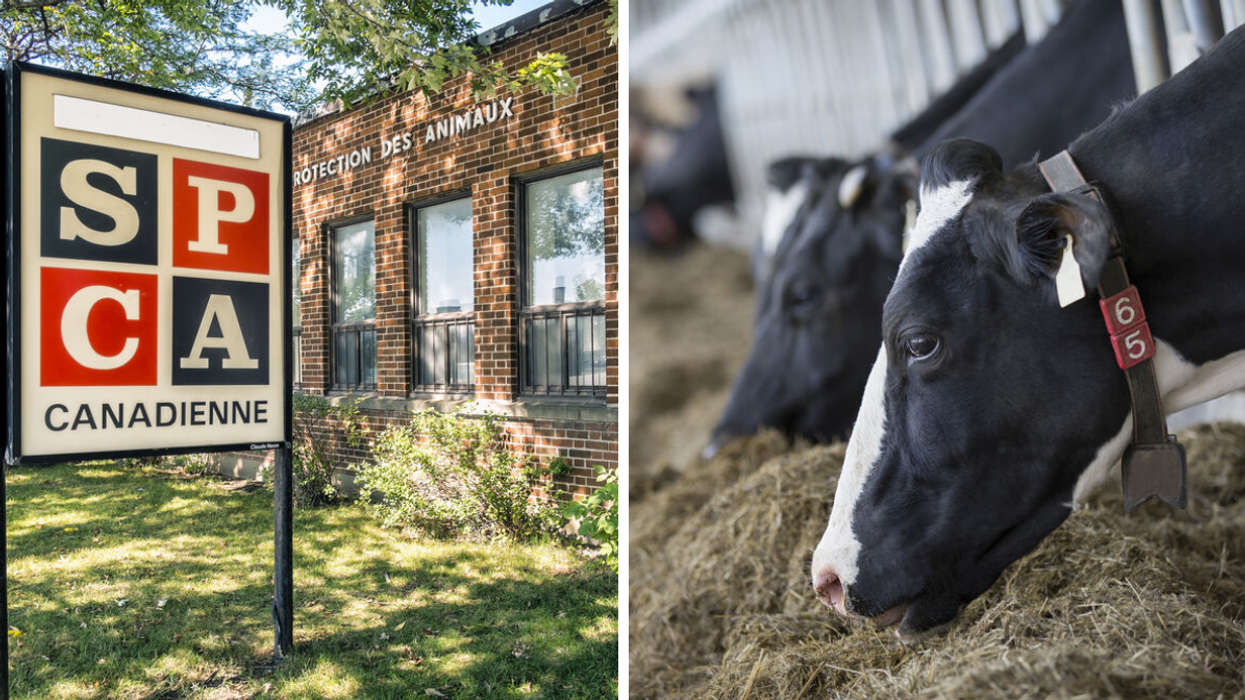The SPCA Is Fighting For The Rights Of For-Food Farm Animals — Here's What They Have To Say
"It is not because they are going to die that they don’t deserve to be protected."

A sign outside the Montreal SPCA building. Right: Cows munch on hay at a Quebec dairy farm.
Unlike many countries worldwide, Quebec has no regulations governing the treatment of animals raised for food, according to Montreal's Society for the Prevention of Cruelty to Animals (SPCA). The organization is engaged in a fight for legal changes, arguing that just because animals are being raised for human consumption doesn't mean they don't deserve humane living conditions.
The issue stems "from the system in which [producers] operate," acting director of the Montreal SPCA, Sophie Gaillard, explained in a recent statement.
"The vast majority of Quebecers believe the government should step in to ensure all animals, including those raised for food production, are afforded the basic protection they deserve," Gaillard continued, citing a March 2023 Léger poll that showed 92% of Quebecers are in support of increased regulations for the treatment of food animals.
The lack of legal protection for raised-for-food animals means that treatments and procedures that are otherwise considered illegal continue unchecked, like the castration of piglets without the use of anesthesia.
"If the same procedure were performed on a dog or cat, it would be punishable by a conviction and even imprisonment" Gaillard explained.
The SPCA argues that Quebec could adopt regulations similar to those in Switzerland, which cover each farmed species and the specific purpose for which it is raised.
Prior activism by the organization has led to changes in Quebec's legal system, including what the SPCA calls "a fundamental reform of animal protection law" that took place in 2015 following the organization's publication Animals Are Not Things, which they term a "manifesto."
This older manifesto led to the adoption of a new law, the Animal Welfare and Safety Act, as well as a provision in Quebec's Civil Code recognizing that animals are "sentient beings." These provisions explicitly exclude all animals used for agriculture, leaving the regulation of their treatment up to the industry.
"We find ourselves in a concerning situation where the industry itself has the power to determine what practices are legal or illegal, regardless of the degree of suffering that they inflict on animals," Gaillard added. “We would never give an industry the power to define what’s legal and what’s not in other sectors; that would be an abdication of government responsibility. However, that’s what we do for farm animals in Quebec."
The new manifesto, specific to agriculturally cultivated animals, has been signed by nearly 26,000 Quebecers, including relative celebrities like singer-songwriter Stéphanie Boulay and several lawyers, veterinarians and college professors.
This article's cover image was used for illustrative purposes only.
- The Montreal SPCA Rescued 8 Abandoned Puppies That Went Without Food & Water For Weeks ›
- The Montreal SPCA Shared 3 Touching Animal Stories From 2020 That'll Bring You To Tears ›
- The Montreal SPCA Is Looking For Someone To Take Care Of Adorable Baby Squirrels ›
- The Montreal SPCA is seeking forever families for these 17 adorable doggos (PHOTOS) - MTL Blog ›
- The Montreal SPCA is offering free and reduced adoption fees this week - MTL Blog ›
